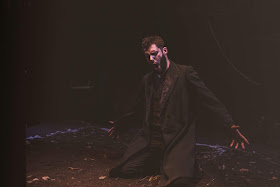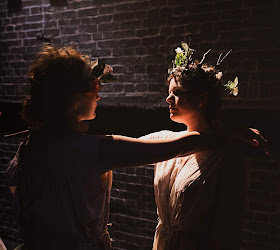 |
| Rameau: Hippolyte et Aricie - Marcio da Silva - Ensemble OrQuesta, Grimeborn Festival 2019 (Photo Andreas Grieger) |
Reviewed by Robert Hugill on 17 August 2019 Star rating: (★★★½)
A welcome opportunity to see Rameau's first opera in a dramatically punchy, small-scale production
 |
| Rameau: Hippolyte et Aricie - Juliet Petrus, Kieran White Ensemble OrQuesta, Grimeborn Festival 2019 (Photo Andreas Grieger) |
Originally written in 1733, Hippolyte et Aricie was performed in Rameau's 1757 revision, which removed the prologue and re-instated some of the more controversial passages which had been cut from the original version. Marcio da Silva's edition of the score trimmed it somewhat, giving us around two hours of music. The dance element was reduced (movement was provided by the singers themselves) and we missed Thésée's crucial Act 5 scene where he expresses remorse.
The opera's librettist, Abbé Simon-Joseph Pellegrin, was an experienced opera hand and he created a highly effective tragédie en musique but in doing so diluted the focus of Racine's Phèdre, so that Phèdre's husband Thésée plays a major role in the opera. He gets a whole act to himself when he descends to the Underworld to rescue his friend. And in need of a happy ending (always a must in tragédie en musique), Pellegrin built up the relationship between Hippolyte and Aricie making it the thread on which the opera hangs, and by having Diane save Hippolyte at the end and restore him to Aricie. The result can be frustratingly diverse, with characters appearing and disappearing.
Marcio da Silva's version was powerful and dramatically punchy. The orchestral forces were similarly reduced with an instrumental ensemble based on a string quintet, arch-lute/guitar and harpsichord, all perched precariously on the theatre's balcony. Conductor Kieran Staub was also up there, which meant he communicated with the singers only via monitor. This was, I think, a mistake and ensemble suffered in the larger scale moments.
 |
| Rameau: Hippolyte et Aricie - Katherine MacRae, Alexandra Bork Ensemble OrQuesta, Grimeborn Festival 2019 (Photo Andreas Grieger) |
Da Silva himself made a powerful Thésée, successfully holding the focus of the act based in Hades. Alexandra Bork was a gutsy Phèdre, giving use some powerful interventions into the action, and a moving final scene. I wondered whether Bork might be more comfortable in later periods of music, and her performance prized dramatic emotion over style.
Kieran White displayed a fine haut-contre tenor, perhaps with a little too much edge for the small theatre space. But he was a fine stylist, and his contributions were always a pleasure to listen to. Juliet Petrus mad a neat and charming Aricie. Aricie is a somewhat passive character, but Petrus made her agreeable and stylish, though I could have wished Petrus' neat account of Aricie's final showcase aria had had a bit more bravura about it.
The smaller roles were all characterfully taken, with Helen May and Katherine MacRae both mellifluous Diane and L'Amour (respectively), and John Holland-Avery was a striking Pluton. I very much enjoyed Jessica Summers' aria as a sailor and wished we would have heard more of her.
Fringe performances of Rameau are always something of a challenge, but then performances of his operas in the UK are so rare that such events are always greatly welcome. But the correct style does not always come naturally to singers and lacking a long rehearsal period, a performance relies on individuals' feel for Rameau's music.
 |
| Rameau: Hippolyte et Aricie - Katherine MacRae, Helen May Ensemble OrQuesta, Grimeborn Festival 2019 (Photo Andreas Grieger) |
If you want a sense of large scale Hippolyte et Aricie with style, try Jonathan Kent's 2014 production at Glyndebourne [available from Amazon on DVD]. But whilst musically superb with an elaborate staging, the results go no further in making Rameau's fascinating but problematical first opera work as a dramatic entity, and I must confess that I am still waiting for my ideal production.
Stage/Music Director: Marcio da Silva
Assistant Stage Director: Benjamin Riedel
Set Designer: Christian Hey
Assistant Movement Director: Vivi Bayliss
Production Assistant: Diego Widen
Conductor: Kieran Staub
Harpsichord: Seb Gillot
Archlute/Baroque Guitare: Cédric Meyer
Violin: Eloise MacDonald, Ada Witczyk
Viola: Joanna Patrick, Michael Bennett
Cello: Erlend Vestby
Hippolyte: Kieran White
Aricie: Juliet Petrus
Phèdre: Alexandra Bork
Thésée: Marcio da Silva
Diane: Helen May
L’Amour/La Prêtresse: Katherine MacRae
Un Suivant de l’Amour/1e Parque/Mercure: Oğuzhan Engin
Jupiter/Pluton/2e Parque: John Holland-Avery
Tisiphone/3e Parque: Oscar Smith
Une matelote: Jessica Summers
Une Prêtresse: Angharad Davies
Elsewhere on this blog
- Central to Yuval Sharon’s production of Lohengrin is its dramaturgical concept based on Wagner’s critiques on science and technology (★★★★★) - opera review
- Carry On meets Dads' Army in this ebullient lark: Rossini's Le Comte Ory at the Grimeborn Festival (★★★) - opera review
- A bel canto career: whilst in London for the London Bel Canto Festival, tenor Bruce Ford talks about the bel canto style and his remarkable career - interview
- Large scale, striking & engaging: Mozart's Die Zauberflöte in an historic quarry in Austria (★★★★) - opera review
- Surprisingly, Tannhäuser has received only a handful of
productions at the Bayreuth Festival and this new production by Tobias
Kratzer chalks up its ninth outing -
(★★★★★) Opera review - Prom 34: Schubert, Tchaikovsky, Lutoslawski from Daniel Barenboim, Martha Argerich and West-Eastern Divan Orchestra (★★★★★) - concert review
- A strong message on anti-semitism: Wagner’s Die Meistersinger von Nürnberg at the Bayreuth Festival (★★★★★) - opera review
- Helen Habershon: Found in Winter (★★★) - CD review
- Prom 26: Mozart's Requiem, Brahms and Wagner from BBC National Orchestra of Wales (★★★) - concert review
- A stupendous achievement for a small opera company: Wagner's Die Meistersinger von Nürnberg from Fulham Opera (★★★★) - opera review
- Exciting, colourful & a challenge: Clarinettist Mark van de Wiel talks about Joseph Phibbs' new concerto which he premiered & has just recorded - interview
- Strip Jack Naked: Stephen McNeff's music theatre piece for Lore Lixenberg (★★★★) - CD review
- Tête à Tête: dance, Chinese folk tales, and the Apollo Mission to the moon - opera review
- Home

No comments:
Post a Comment